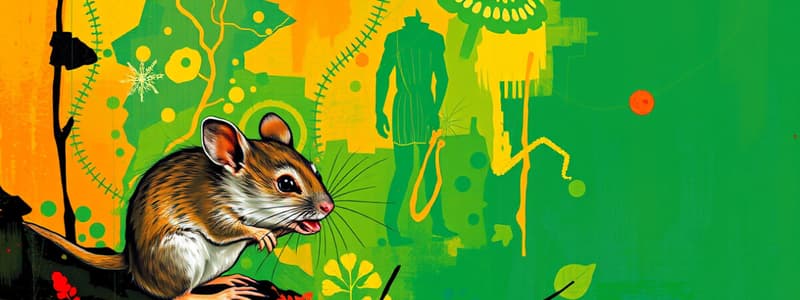Podcast
Questions and Answers
What are the independent variables, the variables that were manipulated by the researcher?
What are the independent variables, the variables that were manipulated by the researcher?
Mouse coat color and the presence or absence of moonlight.
What is the dependent variable, the response to the variables being tested?
What is the dependent variable, the response to the variables being tested?
The number of mice caught.
How many dark brown mice were caught in the light-colored soil enclosure on a moonlit night?
How many dark brown mice were caught in the light-colored soil enclosure on a moonlit night?
How many dark brown mice were caught in the dark-colored soil enclosure on a moonlit night?
How many dark brown mice were caught in the dark-colored soil enclosure on a moonlit night?
On a moonlit night, would a dark brown mouse be more likely to escape predation by owls on dark- or light-colored soil? What data support your conclusion?
On a moonlit night, would a dark brown mouse be more likely to escape predation by owls on dark- or light-colored soil? What data support your conclusion?
Is a dark brown mouse on dark-colored soil more likely to escape predation under a full moon or with no moon? What data support your answer?
Is a dark brown mouse on dark-colored soil more likely to escape predation under a full moon or with no moon? What data support your answer?
Under which conditions would a dark brown mouse be most likely to escape predation at night?
Under which conditions would a dark brown mouse be most likely to escape predation at night?
How many light brown mice were caught in the light-colored soil enclosure on a moonlit night?
How many light brown mice were caught in the light-colored soil enclosure on a moonlit night?
How many light brown mice were caught in the dark-colored soil enclosure on a moonlit night?
How many light brown mice were caught in the dark-colored soil enclosure on a moonlit night?
On a moonlit night, would a light brown mouse be more likely to escape predation by owls on dark- or light-colored soil? What data support your conclusion?
On a moonlit night, would a light brown mouse be more likely to escape predation by owls on dark- or light-colored soil? What data support your conclusion?
Is a light brown mouse on light-colored soil more likely to escape predation under a full moon or with no moon? What data support your answer?
Is a light brown mouse on light-colored soil more likely to escape predation under a full moon or with no moon? What data support your answer?
Under which conditions would a light brown mouse be most likely to escape predation at night?
Under which conditions would a light brown mouse be most likely to escape predation at night?
What combination of independent variables led to the highest predation level in enclosures with light-colored soil?
What combination of independent variables led to the highest predation level in enclosures with light-colored soil?
What combination of independent variables led to the highest predation level in enclosures with dark-colored soil?
What combination of independent variables led to the highest predation level in enclosures with dark-colored soil?
Based on both graphs, what condition(s) are most deadly for both colors of mice?
Based on both graphs, what condition(s) are most deadly for both colors of mice?
Combining the data shown in both graphs, estimate the total number of mice caught in moonlight versus no-moonlight conditions.
Combining the data shown in both graphs, estimate the total number of mice caught in moonlight versus no-moonlight conditions.
Which condition is optimal for predation by the owl on mice?
Which condition is optimal for predation by the owl on mice?
Flashcards are hidden until you start studying
Study Notes
Independent and Dependent Variables
- Independent variables include mouse coat color and the presence or absence of moonlight.
- The dependent variable is the number of mice caught.
Dark Brown Mice Catch Data
- On a moonlit night, 19 dark brown mice were caught in light-colored soil.
- In dark-colored soil on a moonlit night, 12 dark brown mice were caught.
Predation Escape Dynamics for Dark Brown Mice
- Dark brown mice are more likely to escape predation on dark-colored soil during a full moon.
- Fewer dark brown mice (about 12) were caught under full moon conditions compared to nights with no moon (about 20).
Light Brown Mice Catch Data
- On a moonlit night, 18 light brown mice were caught in light-colored soil.
- In dark-colored soil on a moonlit night, 28 light brown mice were caught.
Predation Escape Dynamics for Light Brown Mice
- Light brown mice are more likely to escape predation on light-colored soil rather than dark.
- They were captured more often under full moon conditions (about 18) compared to no moon (about 11).
Optimal Conditions for Escape
- Dark brown mice are most likely to escape predation at night on dark-colored soil with full moon light.
- Light brown mice are best positioned to escape on light-colored soil with no moon.
Predation Levels Based on Coat Color and Soil Color
- Highest predation for dark brown mice occurred on light-colored soil with no moon.
- Light brown mice faced highest predation on dark-colored soil with full moon.
Overall Predation Risks
- The deadliest condition for any mouse color results from high contrast between the mouse's coat color and the background soil.
Total Mouse Counts in Different Lighting Conditions
- Approximately 77 mice were caught in moonlight versus about 95 caught in no-moonlight conditions.
Optimal Hunting Conditions for Owls
- Dark nights yield better hunting conditions for owls, leading to increased predation opportunities.
Studying That Suits You
Use AI to generate personalized quizzes and flashcards to suit your learning preferences.




